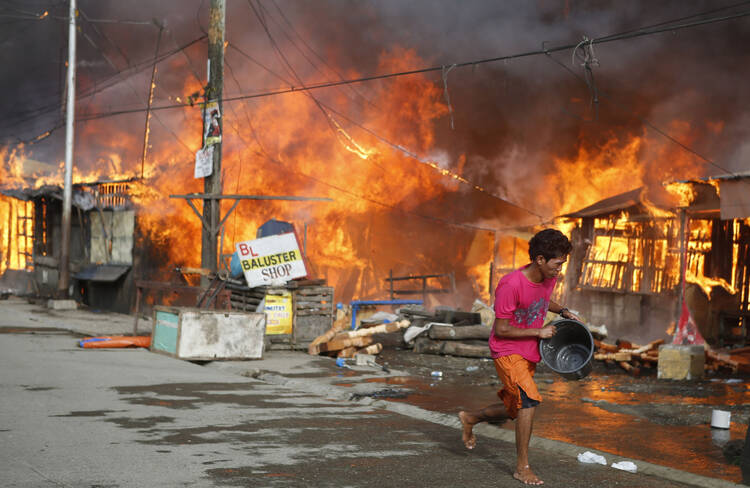Sharing Power for Peace
Even as the Philippines began the long road to recovery after the deadliest typhoon in its history, negotiations to resolve a man-made tragedy plodded on. The national government and the Moro Islamic Liberation Front, the largest rebel group in the Autonomous Region of Muslim Mindanao, took a significant step toward peace with the signing of a power-sharing agreement in early December. For over four decades, Muslim separatists in the south have fought for independence from what they view as an oppressive and exploitative Christian-dominated government. The insurgency has left 200,000 dead and impeded regional development.
Under the deal Manila would control the defense, fiscal and monetary policy of Bangsamoro, the political entity poised to replace Mindanao. The new autonomous government would be granted broad powers over internal matters like trade, tourism and education.
This progress, however, remains fragile. In September, Moro rebels left out of the latest round of peace talks laid siege to the predominantly Catholic Zamboanga City, sparking a weeks-long standoff with the military in which 200 were killed and many more displaced. A group of Catholic and Protestant bishops and ulema (Muslim religious leaders) condemned the violence as “inhumane, non-Christian, non-Islamic and contrary to the teachings of our respective faiths.” Sustaining such interfaith solidarity in the months ahead will be indispensable to translating signed agreements into lasting peace on the ground.
A.C.L.U. v. U.S.C.C.B.
A recent lawsuit filed by the American Civil Liberties Union against the U.S. Conference of Catholic Bishops should challenge any complacency about the future of Catholic health care in the United States. The suit alleges that a young mother received improper treatment at a Catholic health facility in Muskegon, Mich., as a miscarriage dangerously progressed. But the A.C.L.U. has elected to build its suit not on any purported malpractice at the health center (Mercy Health Muskegon has yet to describe its side of the story), but on a novel accounting of negligence.
According to the A.C.L.U., it is not the attending physicians who may be at fault for any alleged lapses, but the U.S. bishops because of their promulgation of the church’s “Ethical and Religious Directives,” a longstanding guideline for treatment at Catholic health institutions. The directives prohibit direct abortion. The A.C.L.U. argues that the prohibition contributes to substandard care for women experiencing crisis pregnancies. The lawsuit is an obvioius threat to religious freedom. It is also incoherent, for it presupposes an alarming indifference on the part of medical licensing and accreditation boards nationwide that should have long ago intervened, had the bishops’ directives truly put patients in Catholic hospitals at risk.
The A.C.L.U. misunderstands several things about the church and how authentic expressions of faith are “lived” in society—how the directives actually work in the field, for one. Catholic bishops are not making decisions about care. The difficult calls are left in the hands of doctors and, when required, hospital ethics review boards, which are allowed broad latitude in any difficult, high-risk judgments. The suit also ignores the existence of Directive 47, which allows treatment in crisis situations even when it might result in the indirect termination of a pregnancy.
It appears that for the A.C.L.U. religious expression is a personal experience best confined to worship within a church building. But it was authentic religious expression and a deep respect for the value and dignity of all human life that built these institutions of care and service in the first place, and it is authentic—and free—religious expression, properly engaged with the world, that must be allowed to guide them still.
Sacred Lands Restored
Recently, the Muckleshoot Indian Tribe purchased 96,307 acres of forestland and streams northwest of Tacoma, Wash. The Muckleshoots will manage the land for “long-term sustainable timber harvest, while preserving natural values including fish and wildlife habitat.” This single event might not be noteworthy if it were not part of a much wider pattern emerging in Indian country.
The Confederated Salish and Kootenai Tribes of Montana became the first in the nation, in 1979, to set aside tribal land—92,000 acres of the Flathead Reservation’s mountains and meadows—as wilderness. The Assiniboine and Sioux tribes in northeastern Montana are bringing back bison on the Fort Peck Reservation. In Minnesota, the Chippewa, or Ojibwa, have restored a ravaged walleye population at Red Lake.
Often enough the tribes are major partners with their neighbors in successful efforts to restore fish and wildlife. These efforts are not surprising when one understands a core value of Native American spirituality: the intimate relationship between human beings and the land. Christian reverence for God and creation has too often been marred by greed and domination. All people would benefit from an encounter and dialogue with native communities and their respect and care for the land.








